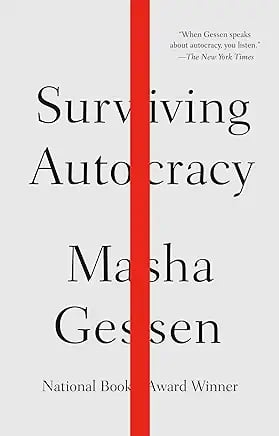

"It was as if the virus and the president were working in concert. Not only did the pandemic cripple the existing political system, it demanded that Trump govern in precisely the manner to which he aspired: unilaterally, decisively, with few checks on his power– and with the eyes of the nation riveted to him. And though he had little interest in understanding the problem; he was reluctant to use his executive power actually to fight the pandemic; though he was inconsistent and apparently incapable of staying on point, showing empathy, or comprehending the gravity of the situation– he still got to be the center of attention, he still got to show that he was in charge, and he got to watch his approval ratings climb. In The Origins of Totalitarianism, Hannah Arendt identified a key precondition: ‘Only where great masses are superfluous or can be spared without disastrous results of depopulation is totalitarian rule, as distinguished from a totalitarian movement, at all possible.’ She was writing about state terror, which is possible only when a regime is willing to sacrifice millions of its own people. A pandemic also exerts terror. Effective terror is random; terror has been achieved when every person in the population has a credible fear of suffering and dying. COVID-19 was not unleashed by the state under the cover of ideology, but it has functioned like terror. Trump did not deploy the virus, but he was positioned to reap its reward: a population gripped by terror created extraordinary opportunities for him as he continued to grope his way to autocratic rule."
Surviving Autocracy by Masha Gessen - 2021
"How could one really say that it was impossible to know what problem Trump’s one hundred new fighter planes would address? What if the problem was just very, very elusive? It seemed more prudent to say that it was difficult to locate the problem. And– this was a corollary of the problems with saying that Trump was a liar or a racist– what if members of the administration really did know what they wanted to do but were for some reason terrible at explaining it? How could a journalist claim to have observed the vacuums in their minds? The pedantic insistence on only ever reporting empirically proven facts, and staying away from facts for which only logical, intellectual evidence can be summoned, creates the blurry style of American journalism. By using noncommittal statements, the blurry style in effect aids the Trumpian project of neutralizing the most important of media rights– the public’s right to know."
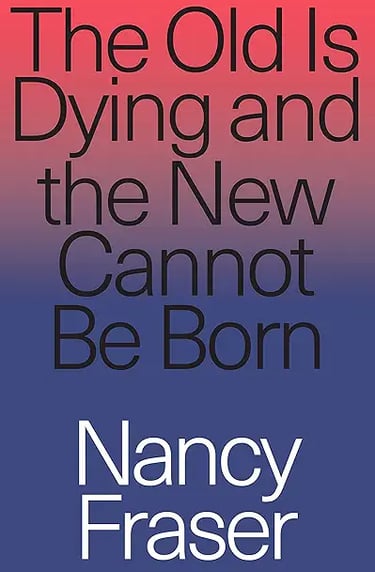

"Trump’s hyperreactionary neoliberalism does not constitute a new hegemonic bloc, however. It is, on the contrary, chaotic, unstable, and fragile. That is partly due to the peculiar personal psychology of its standard-bearer and partly due to his dysfunctional codependency with the Republican Party establishment, which has tried and failed to reassert its control and is now biding its time while searching for an exit strategy. We cannot now know exactly how this will play out, but it would be foolish to rule out the possibility that the Republican Party will split. Either way, hyperreactionary neoliberalism offers no prospect of secure hegemony. But there is a deeper problem. By shutting down the economic-populist face of his campaign, Trump’s hyperreactionary neoliberalism effectively seeks to reinstate the hegemonic gap he helped to explode in 2016– except that it cannot now suture that gap. Now that the populist cat is out of the bag, it is doubtful that the working-class portion of Trump’s base will be satisfied to dine for long on (mis)recognition alone."
The Old Is Dying and the New Cannot be Born by Nancy Fraser - 2019
Trump, the Shell Game by Paul K. Schwartz - 2020
“Case in point, the June 13 Senate Intelligence Committee hearing and the testimony of Attorney Jeff Sessions. Sessions, like the testimony given by both Director of the National Intelligence Dan Coates and NSA Director Mike Rogers before the committee at an earlier date, was under the misguided impression that he only had to answer those questions he chose to and disregard any questions he considered objectionable, especially any questions that related directly with Donald J. Trump. The absurdity of offering this kind of testimony was made abundantly clear by the committee member from New Mexico, Senator Martin Henrich, who pointed out that the options are limited. Either the attorney general must answer the question or give some legal grounds for not, such as executive privilege, which he has not yet done, so what is the legal basis for refusing to answer committee questions? It is not the ongoing Russia investigation since, as Sessions noted, he has recused himself from that investigation. Then what is it? You wonder. Well, according to Sessions, while he is not himself invoking executive privilege, he feels obligated to not answer these questions relating to his discussions with the president just in case the president chooses to invoke executive privilege at a later date. This, of course, is absurd on its face, but especially absurd coming from the number one law enforcement official in the nation, the attorney general. I don’t claim to be a constitutional lawyer, although I have stayed at a Holiday Inn Express, but Session’s excuse somehow smells like an ex post facto law, which is prohibited in Article I, Section 10 of the Constitution. Ex post facto laws change the rules of evidence in a criminal case, alter the definition of a crime, increase the criminal punishment for a criminal act, or punish conduct that was legal when committed retroactively. Was Attorney General Sessions, by avoiding answering questions dealing with Trump, attempting to keep open the president’s window to invoke executive privilege retroactively even though he has not yet done so? Maybe Sessions was just trying to reap the benefit of executive privilege without the need for Trump to raise questions about his motive for invoking executive privilege. That sounds about right. The smell doesn’t stop here. Sessions, during his testimony, also went to great lengths to imply that former director of the FBI James Comey breached protocol by meeting alone with the president. Specifically, he was referring to the now infamous meeting mentioned by Comey during his testimony before the Senate committee a week earlier that, as Comey explained it, the president cleared the room after a meeting in which both Sessions and Jared Kushner were in attendance but which Trump asked Comey to stay behind for a one-on-one. In Session’s version, while the president can basically do whatever he wants, Comey breached protocol by staying behind to meet alone with the president. Well, now, if it was Comey who breached protocol, why did Sessions, Comey’s superior in the chain of command, not stay behind? The answer, quite clearly, is because Comey’s version was the only version that made any sense and Session’s version failed the smell test. Want more odors? Sessions was emphatic that he supported Comey’s firing because of Comey’s poor job performance, yet he also readily admitted that neither he nor Deputy Attorney General Rod Rosenstein ever discussed the poor performance with James Comey. Anyone who has worked in the federal government knows that this is simply not how it is ever done even if the position of FBI director is not part of the bargaining unit, which it isn’t.”
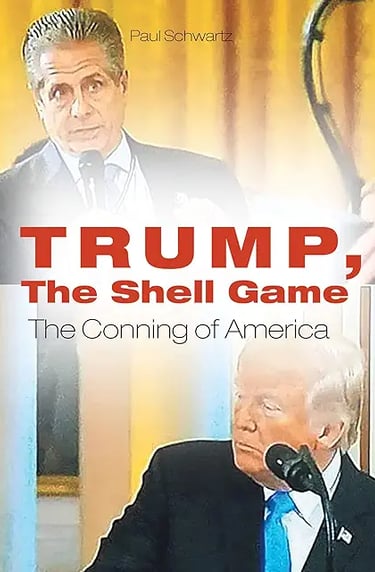

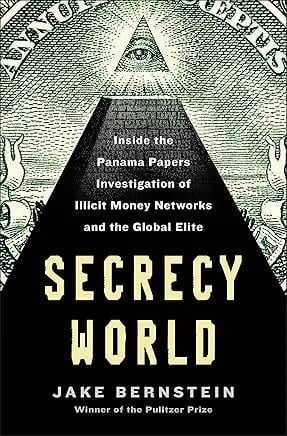

Secrecy World by Jake Bernstein - 2017
"Trump SoHo was star-crossed from the start. The building site, it turned out, was on the grounds of a former African Methodist Episcopal church, and during construction, workers unearthed the bones of those buried in the churchyard, causing delays as those remains were disinterred and moved. A worker died on the job when he fell forty-two stories and was decapitated. Before completion, Trump lied about how quickly the nearly four hundred units were selling, claiming the project had received thirty-two hundred applications when in fact only about sixty apartments had found buyers by the time the building opened in April 2010. Ivanka also fabricated sales figures, publicly stating that 60 percent of the units had sold. Angry buyers filed lawsuits alleging that the sales figures had been inflated. In a settlement in 2011, a number of the buyers received 90 percent of their deposits back. The developers had sold fewer than a third of the units by 2014, forcing the building into foreclosure where it was sold at auction. Among the buyers for Trump SoHo condos were a family from Kazakhstan, the Khrapunovs, who in 2013 purchased three apartments for $3.1 million. The family is accused by the Kazakh city of Almaty of buying U.S. real estate through anonymous shell companies in order to launder hundreds of millions of dollars that Viktor Khrapunov allegedly stole while mayor of the city. The Khrapunovs deny the charges and claim they are dissidents, persecuted politically by the country's authoritarian ruler, President Nursultan Nazarbayev."
"A civil suit against Bayrock filed by a former employee, Jody Kriss, speculated that some of the money behind FL Group was Russian in origin. Kriss alleged that Bayrock operated for years through 'a pattern of continuous, related crimes, including mail, wire, and bank fraud; tax evasion; money laundering; conspiracy; bribery; extortion; and embezzlement.' He further alleged that the FL Group's investment in the Trump SoHo project was in fact a sale disguised as a loan, to avoid paying approximately $20 million in taxes. Bayrock denied the allegations. Trump insisted he had nothing to do with the financing, lending only his name. 'I don't know who owns Bayrock,' Trump said in a deposition in 2011, despite having signed a document that stated clearly that FL Group was helping to finance the project."
73
74
75
76
The Quiet Damage by Jesselyn Cook - 2024


77
"Key facts behind the outbreak were slow to emerge as scientists scrambled to study a mutating coronavirus previously unknown in humans. But as people's anxieties over losing their income, businesses, personal freedoms, and even loved ones soared, their patience rapidly dwindled. With QAnon, they didn't have to wait. It had an explanation for everything. Amplified by social media algorithms and echoed by a cacophony of right-wing media stars, pundits, and politicians, QAnon influencers swooped in to fill the information void with their own twisted version of events: A cabal of liberal, globalist elites was plotting a New World Order. Covid-19- whether it was a Chinese bioweapon, akin to the flu, or something else entirely- was part of the elites' scheme to subdue the masses through fear. They inflated death tolls, cranked out alarmist news coverage, and silenced dissenters through social media censorship. Lockdowns, curfews, mask mandates, and social distancing rules were oppressive measures to yield public subservience. The same was true of the coming vaccines, which could also be tools to implant location-tracking microchips or to wipe out humanity- only time could tell. Cabal-commanded telecom giants were rolling out 5G technology to make people sick. Black Lives Matter rallies and protests in the wake of Floyd's death (a false flag) weren't really about racial justice at all; they were orchestrated by antifa to stymie Trump's rising support among the Black electorate. Everything- everything- could be contorted to fit the conspiracy theory. That was the lens through which Alice and myriad others came to view their suddenly frightening, uncertain world. More than a quarter of Americans believed the microchipping theory at the time. Close to a third thought that the virus was 'purposely created and released' and that the threat it posed was being 'exaggerated by political groups' who sought to damage Trump. Trump leaned into these sentiments without evidence to support them, going so far as to suggest that he was being sabotaged by members of his own administration. His reference to the State Department as 'the Deep State Department' during a press briefing provoked what appeared to be an incredulous facepalm from Dr. Fauci, who to Trump's ire, had already repeatedly publicly corrected him. (A Cornel University study would later find the president to be the single largest superspreader of Covid-19-related falsehoods.)"
"In this regard, QAnon was a microcosm of the Trumpian Right: a more extreme and insular product of harmonized lies from right-wing politicians, media figures, and influencers, which were repeated until they sounded believable- a phenomenon known as the 'validity effect.' Inside their at-times cult-like ideological echo chamber, they, and they alone, dictated what was true. Loyalty trumped logic, while an entrenched with-us-or-against-us mentality cast outsiders as enemies: Reporters, scientists, field experts, and other external purveyors of information were never to be trusted. This kind of 'tribal epistemology,' a term coined by journalist David Roberts, was apparent from Trump's first full day in office, when White House press secretary Sean Spicer falsely claimed that his boss had drawn 'the largest audience to ever witness an inauguration.' Trump's crowd size was actually a fraction of Obama's, which was immediately obvious from looking at aerial photos of both events. Yet when researchers presented those images to people who voted for Trump, 15 percent still bafflingly pointed to his ceremony as having the greater turnout. Already, Trump's hold over an expanding portion of his base- his tribe- was more powerful than black-and-white, smack-you-in-the-face reality itself; facts be damned. Standing with the tribe was more important than standing for the truth when one's ideology became their identity."
"Dale, part of the Silent Generation, and Doris, on the cusp of being a Baby Boomer, belonged to the fastest-growing group of users on Facebook. The number of seniors on the site nearly doubled between 2012 and 2019. A concerning feature of their online behavior quickly became apparent: They were consuming and disseminating information with relatively limited skepticism- in fact, they were four times more likely than 'digital natives' to share fake news. This heightened vulnerability to online falsehoods could be due in some cases to cognitive aging, researchers determined, but also, to a limited understanding of how social media platforms operate behind the scenes. A third of 'digital immigrants' over sixty-five believed that the news articles in their Facebook feeds were selected by a group of company employees, just as a team of editors would decide which stories to put in the Times. Only 18 percent were aware that it was done by machine-learning programs. . ."
"What the siblings couldn't have foreseen was that Emily's 'brainwashing' had only just begun - that Carlson and his colleagues, through an IV drip of victim mentality rhetoric, were priming her for a transformation much more extreme than simply switching political parties. It was far easier to believe in antiestablishment conspiracy theories after being conditioned to identify as a victim of the establishment."
78
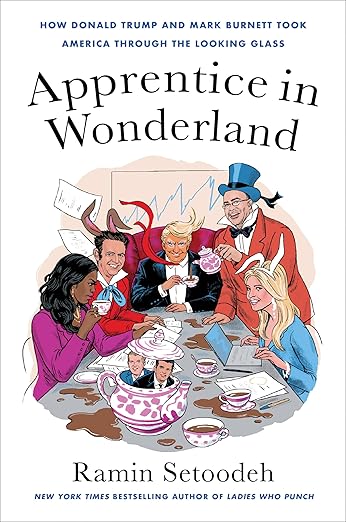

Apprentice in Wonderland: How Donald Trump and Mark Burnett took America through the Looking Glass by Ramin Setoodah - 2024
"Trump is acutely aware of why he even gets airtime. ‘She needed the numbers,’ he says about Welker. ‘I heard I did phenomenally good.’ (The episode, Welker’s first as the new Meet the Press moderator, beat its competition on ABC and CBS.) ‘That’s what I am- a ratings machine! I do all these shows, even these political shows, they double and triple and quadruple. That’s why they like me doing them.’ Trump has caught the media in its own hypocrisy. He knows they’re inviting him on TV for the spectacle, and so it’s a self-fulfilling prophecy where he does his best to deliver so that they keep him coming back."
"In the brand-integration scenes, major CEOs would appear briefly to explain the identity of their company and how the contestants’ work would need to cohere with their objective. They’d usually also judge the final product, although they never made it into the final boardroom. Trump was still the only one with the power to fire contestants. It wasn’t too far off from how American Idol, for example, would later invite Lady Gaga and Miley Cyrus on as guest members and to plug their music. (One key difference: Idol didn’t make its creators richer by asking Gaga and Miley to pay for the privilege of airtime.) For Trump, this scenario proved to be all upside- with only more upside. On The Apprentice, seeing Trump rub shoulders with business leaders only added to his clout, reinforcing his image as a globally connected boss. ‘It was such an experience,’ says Carolyn Kepcher. ‘Because you are able to meet executives and learn how they work- Mattel and these other big companies. We got a lot of background.’ Unlike Kepcher, Trump was so set in his ways that he’d never take a lesson from a peer. But in performing curiosity about how other companies functioned, he along with (Mark) Burnett, laughed all the way to the bank. ‘We had a unique thing on The Apprentice,’ Trump says. ‘Mark and I, we were equals. I got a star fee. But then we were allowed to keep the advertising dollars. General Motors would come along and pay us $5 million to do an advertising campaign for their new car, and so on and so on.’"
"Trump presented a conundrum for a reporter: he might have been the sower of chaos all over the globe, and he certainly lacked empathy, but he could also be funny and engaging in conversation. But regardless of what version of Trump I saw in all our time together, it became clear to me in our first post-presidency meeting that there was no way to reasonably interview Trump as a politician. He’s not a politician. There’s no way to ask him about governing. He’s not able to govern. There’s no point in trying to pin him down on his hopes for another term. He doesn’t care about the specifics of the plot during his time in the White House- he just wants to get renewed for another season."
79
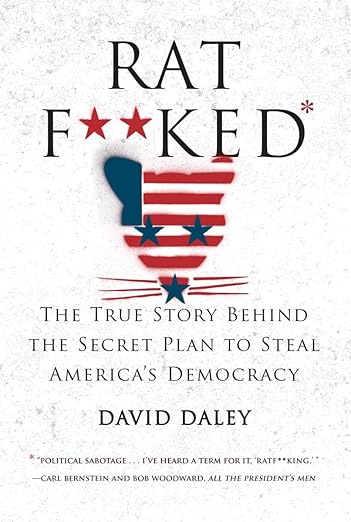

"For the rebels, the GOP majority was real. They wanted to use the party's edge, aggressively and decisively, to roll back Obamacare, derogate and defund Planned Parenthood, battle over the debt limit, and enforce a hard line on immigration. They did not care if the Speaker and other party leaders weren't up for the same fight. The huge GOP congressional majorities, meanwhile, created outsized expectations of conservative victories, especially among the base and within conservative media, firing up a virulently angry GOP electorate just as the 2016 presidential race began and fueling the rise of outsiders like tough-talker Donald Trump and trusted true believers like Ted Cruz and Ben Carson. Veteran conservative leaders including Jeb Bush, John Kasich and Chris Christie struggled to find traction as the legislative hydra unleashed by gerrymandering took over the GOP. Talk about ratfucked."
Ratf**ked by David Daley - 2016
"The simple truth is this: American is the only major democracy in the world that allow politicians to pick their own voters. And since the 2010 election, the system has been gamed to create an artificial-but foolproof- Republican majority in the House and in state capitals worldwide. . . When districts are uncompetitive and weighted to advantage one party, the only election that matters is the party primary, which means the only pressure on the majority of our elected representatives- the Republicans, in other words- comes from a sliver of the far right. This is why we have no action on gun control, despite the increasing carnage that has transformed our schools and colleges into crucibles of fear and occasionally bloody scenes of horror."